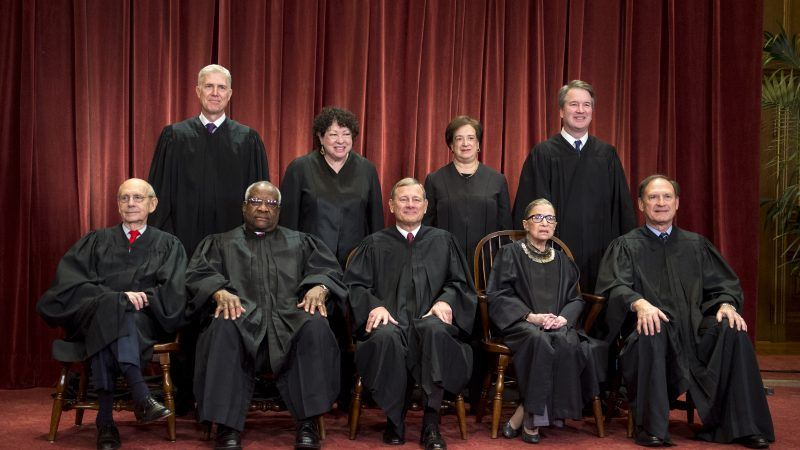The Supreme Court Probably Won't Kill Roe Yet
SCOTUS is likely to restrict abortion access, but in a more gradual way.

This week the state of Alabama enacted one of the strictest anti-abortion measures in U.S. history. The Alabama Human Life Protection Act bans abortion throughout every stage of pregnancy, with no exceptions for victims of rape or incest, and with only a limited exception when the life or health of the mother is at risk. Any doctor who performs a proscribed abortion in the state will be committing a class-A felony, punishable by up to 99 years in prison.
"Many Americans, myself included, disagreed when Roe v. Wade was handed down in 1973," declared Republican Gov. Kay Ivey, in a statement accompanying her signing of the law. "The sponsors of this bill believe that it is time, once again, for the U.S. Supreme Court to revisit this important matter, and they believe this act may bring about the best opportunity for this to occur."
The Alabama law undeniably violates Roe v. Wade, in which the Supreme Court held that a woman may have an abortion for any reason during the first trimester of her pregnancy. It is only during the third trimester of pregnancy, Roe said, when a state may regulate "and even proscribe" abortions, except when "the preservation of the life or health of the mother" is at stake.
The Alabama law also undeniably violates the Supreme Court's 1992 holding in Planned Parenthood of Southeastern Pennsylvania v. Casey, which both upheld Roe and introduced a new standard to the Court's abortion jurisprudence: the undue burden test. According to Casey, it is unconstitutional for a state to enact a regulation for "the purpose or effect of presenting a substantial obstacle to a woman seeking an abortion." That, the Court held, would "impose an undue burden on the right."
So what happens next with the Alabama abortion ban? Planned Parenthood and other groups have already vowed to fight the law in court. Assuming such cases come before a federal district court judge who follows Supreme Court precedent (which those judges are supposed to do), the law will be ruled unconstitutional under the Roe/Casey precedents (which it is). The state, assuming it still wants to press the fight, would then appeal to the federal appellate court, which may not even take the case. But let's say it does take it, and that those judges also follow precedent and strike down the law. At that point, having lost in the lower federal courts, and assuming the state is still under the same conservative leadership, Alabama would appeal the case to the Supreme Court.
But there's no guarantee that SCOTUS will take the case either. Indeed, it is even possible that the Court might prefer to sit this one out. Why? Because even those conservative justices who might want to see Roe/Casey overturned might still prefer to see the precedents gradually weakened and narrowed over time, via a series of cases, rather than simply obliterated in one fell swoop.
That, I suspect, is the approach that will be favored by Chief Justice John Roberts. As the legal journalist Joan Biskupic recently put it, "Roberts works incrementally, laying groundwork for his views, keeping an eye to upcoming cases, and avoiding any 'jolt' to precedent."
Here is one thing that we can expect on the abortion front at SCOTUS. In 2016, the Supreme Court struck down a Texas law that required all abortion clinics in the state to meet the same standards required of ambulatory surgical centers and also required all doctors who perform abortions in the state to have admitting privileges at nearby hospitals. "We conclude that neither of these provisions offers medical benefits sufficient to justify the burdens upon access that each imposes," observed the 5-3 majority opinion of Justice Stephen Breyer in Whole Woman's Health v. Hellerstedt. "Each places a substantial obstacle in the path of women seeking a previability abortion, each constitutes an undue burden on abortion access, and each violates the Federal Constitution."
The next time that sort of abortion case comes before the Supreme Court, we can expect it to come out the other way.


Show Comments (247)